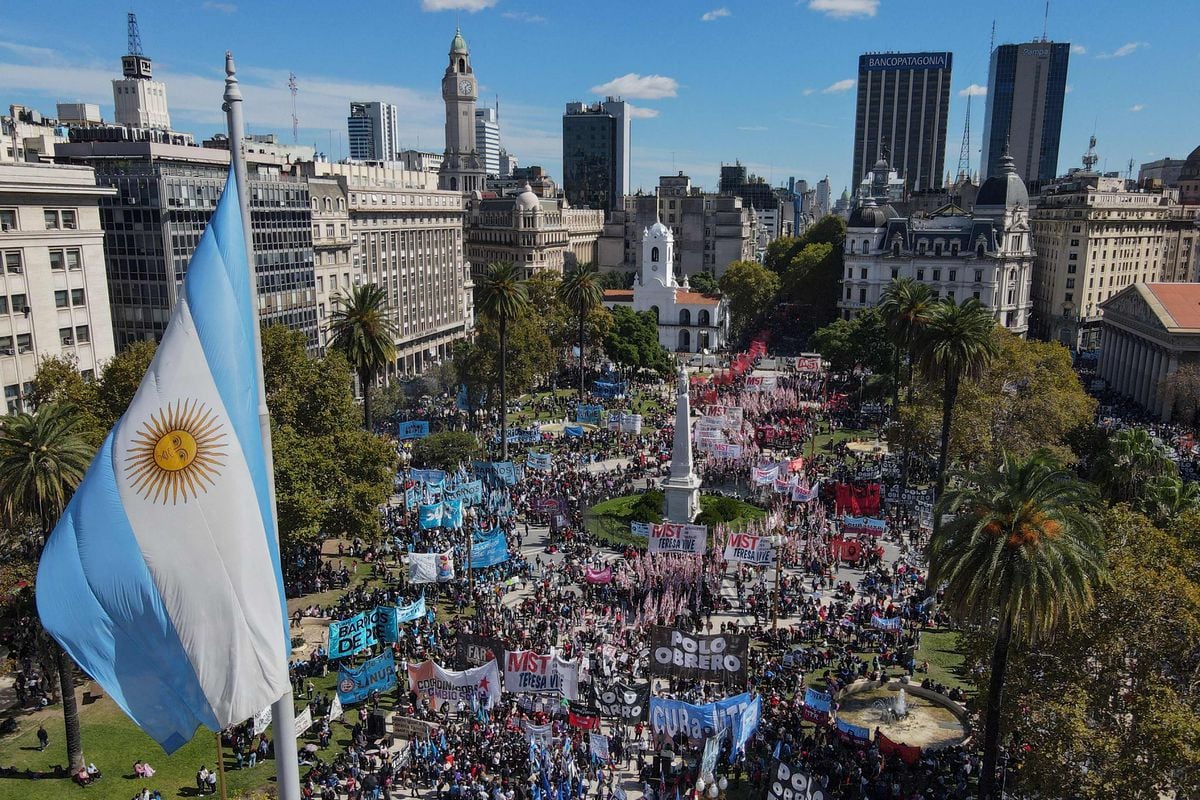Inflation is skyrocketing in Argentina, more than ever.
Prices rose 6.7% in March (55.1% year-on-year), the worst record since April 2002, when the corralito crisis was intensifying.
The rise has been more serious in food: 7.2%.
This is a particularly sensitive item due to its impact on the poorest.
The conflict in the street grows along with the loss of purchasing power of the local currency.
This same Wednesday, social organizations not aligned with the Casa Rosada marched towards the Plaza de Mayo and blocked the 9 de Julio, the main avenue of the city of Buenos Aires, for hours.
It has been a complicated Wednesday for President Alberto Fernández.
Along with the inflation figure and the street mobilization, Cristina Fernández de Kirchner returned, her worst enemy in the internal one that bleeds the government dry.
Cristina Fernández de Kirchner inaugurated the European-Latin American Parliamentary Assembly (EuroLat) in Buenos Aires, which is meeting in person for the first time since the pandemic.
The stage could not be better.
The vice president recalled that it was she who inaugurated the Kirchner Cultural Center (CCK) in 2015, a monumental work that transformed the Central Post Office building into a large venue for conventions and cultural events.
The CCK was an icon of the economic booms of the first Kirchnerism.
This Wednesday, the Argentine public received Cristina Fernández de Kirchner standing up, with a standing ovation, before the astonished gaze of Latin American MEPs and legislators, unknowingly invited to a local rally.
Kirchner spoke about the role of the State in the post-pandemic, and immediately remembered the president and the rivalry that confronts them.
“We speak of power when someone makes a decision and that decision can be applied and is respected by society as a whole.
That is power.
That they put a band on you and give you the cane a little is, but believe me, believe me… ”, he said, shaking his head.
"And I won't even tell you if the things that need to be done are not done, but let's leave it there," he added.
Kirchner's was a shot aimed at Alberto Fernández that magnifies the conflict in an asymmetrical government coalition.
The vice president considers that she is the real power and that Fernández owes her the presidency.
The president, for his part, assures that he is not anyone's puppet and through his spokesman asks his detractors of Peronism to "at least not get in the way."
It is in this scenario of weakness that the Executive must fight against inflation.
“Political support is needed because the economy does not function in a vacuum,” Economy Minister Martín Guzmán warned on Tuesday, anticipating that the CPI would be “above 6%.”
The strategy against rising prices divides Fernández and his vice.
"Economists related to Kirchnerism tell you that we are facing a distributive bid," explains Marina Dal Pogetto, director of EcoGo Consultores.
“That bid escalates when inflation goes at this rate of 6% per month: the one who wins with inflation wants to maintain and the one who loses with inflation wants to recover.
If everyone wants to win, the wheel goes faster and faster,” she says.
It is the race of prices against wages.
Kirchnerism is therefore committed to controlling the former with agreements with companies and encouraging the latter to beat the IPC.
In the Fernández Executive, the argument is that the trigger is a consequence of the Russian war in Ukraine and that it must be attacked with macroeconomic policies: less fiscal deficit,
fewer energy subsidies (they climbed to 11% of GDP in 2021) and less monetary issue.
That is the emergency formula agreed with the International Monetary Fund, just bad words for hard-core Kirchnerism.
The agreement with the IMF ended up blowing up the alliance in the Argentine presidential binomial.
Today there are rumors of a change of ministers that will cleanse the Executive of Kirchnerists.
Such a step would leave Fernández without his main electoral base, but it would also protect him from friendly fire, like the one he received this Wednesday from Cristina Fernández de Kirchner.
Meanwhile, the market bets on the continuity of Martín Guzmán, the minister who agreed with the IMF.
“Although it is not fully convincing, the alternative could generate even greater uncertainty,” says Pablo Waldman, senior strategist at the digital investment platform Inviu.
“The deal with the IMF largely clears out potential worst-case scenarios.
The market expects the current minister, to the best of his ability, to try to fulfill the agreement reached.
Argentina will undergo quarterly IMF reviews, the first next month.
It needs to pass the test for the $4.1 billion of the planned second disbursement to arrive.
When the agreement ends, within 30 months, the South American country will have received 45,000 million dollars, which it will use to pay dollar for dollar the debt that Mauricio Macri assumed with the multilateral in 2018. And then, start again.
Subscribe here to the EL PAÍS América
newsletter
and receive all the key information on current affairs in the region.

